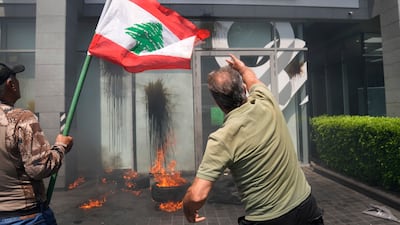Inflation in Lebanon hit an annual rate of 260 per cent in May as a political impasse over the election of a president persisted, thwarting the enactment of reforms deemed necessary for the country to emerge from its worst economic crisis.
Hyperinflation continued for the 35th consecutive month as the country's currency continued to lose value on the parallel and official markets since it was devalued by 90 per cent at the start of February.
The increase in the cost of living was led by soaring communication, alcoholic beverage and tobacco costs, and an increase in restaurant and hotel prices, the Central Administration of Statistics' Consumer Price Index showed.
The CPI increased by about 5.4 per cent from April 2023.
Lebanon's inflation rate had begun to decline after hitting 171 per cent last year, the highest in about four decades, and 155 per cent in 2021. However, it started to pick up early this year as the country's central bank devalued the Lebanese pound in February.
The official exchange rate changed to 15,000 pounds to the US dollar, compared with the peg in place since 1997 of 1,507.50 to the greenback.
The country is in the grip of an economic crisis described by the World Bank as one of the worst in modern history and has yet to enforce critical structural and financial reforms required to unlock $3 billion of assistance from the International Monetary Fund, as well as billions in aid from other international donors.
The country has a caretaker cabinet led by Prime Minister Najib Mikati, with limited powers. It also needs to elect a president after the six-year term of Michel Aoun ended at the end of October, but this requires the consensus of the country's political elite.
Earlier this month, Lebanon's parliament failed to agree on a new president at the 12th attempt.
Political impasses have led to vacuums in the country in the past and stalled Lebanon's economic progress.
The country was without a president for two and a half years until Mr Aoun's election by the 128-seat parliament in 2016.
His predecessor, Michel Sleiman, was elected in 2008 with the help of Qatar, after 19 postponements, ending an 18-month political crisis.
Communication costs increased more than sevenfold in May, compared with the same month in 2022, while alcoholic beverages and tobacco costs increased more than five times and restaurant and hotel prices leapt more than fourfold.
Health costs and the prices of food and non-alcoholic beverages increased four times while transport and clothing and footwear costs increased more than three times.
Lebanon's economy contracted by about 58 per cent between 2019 and 2021, with gross domestic product falling to $21.8 billion in 2021, from about $52 billion in 2019, according to the World Bank – the largest contraction on a list of 193 countries.
The World Bank estimates that real gross domestic product declined 2.6 per cent in 2022 and is projected to contract 0.5 per cent this year.


